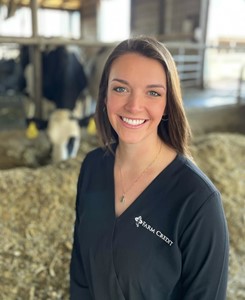Newsroom
Loans v. Leases – What’s Your Best Option?
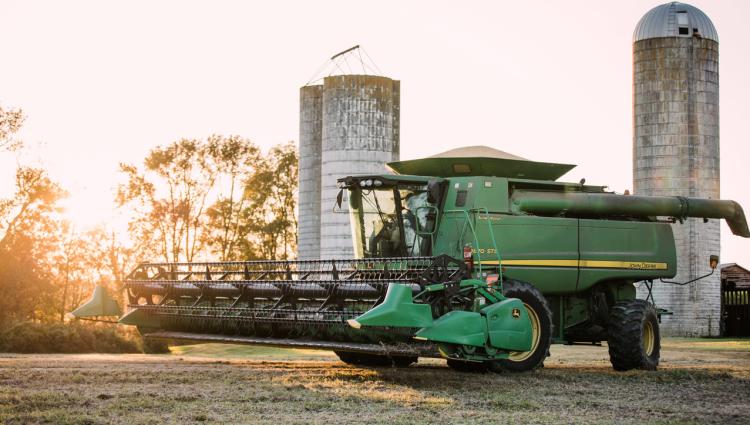
Financing equipment is a great tool to keep working capital in your hands. Loans and leases are both viable options, but what is the difference between the two, and which will work best for your operation?
Most people are familiar with a loan, but leasing is another way for customers to obtain the equipment they need to get back in the field. A lease is an agreement between the equipment owner (lessor) and a customer (lessee) to pay for the use of the equipment in the form of rental payments for a specific amount of time with an option to return or purchase the equipment at the end. At the end of the lease term, you then have the option to purchase the equipment you have been using.
An important term to understand when it comes to leasing is residual value, which is the value of the equipment at the end of the lease (and the stated purchase price that the lessee would pay should they choose to purchase the piece at the end of the lease). The residual value helps determine what payments will be. A higher residual means lower lease payments.
Let’s look a little closer at the differences between loans and leases, then look at an example.
| LOAN | LEASE |
| May require down payment | No down payment required, but first payment due at signing |
| Remaining amount after down payment is financed | Only the amount of the expected use is financed |
| May require additional collateral for 100% financing | Equipment itself is only collateral |
| Risk tied to the customer | Risk tied to the asset |
| Payment back on a borrowed amount | Payment in advance |
| Ownership of asset creates depreciation benefits | Rental of asset to gain tax payment deduction benefit OR can be written for depreciation |
| No usage limits | Potential annual hour/acre/bale usage |
Let’s walk through an example:
A customer is looking to acquire a $100,000 tractor. He’d like to work with Farm Credit for a loan or lease and is comparing the two options.
| Farm Credit LOAN | Farm Credit LEASE | |
| Equipment Cost | $100,000 | $100,000 |
| Term Length | 60 months/5 years | 60 months/5 years |
| Rate | 7.35% | 6.8% |
| Monthly Payment | $1,996.94 | $1,247.57 |
| Residual | Not applicable | $51,000 |
| Customer takes depreciation | Yes | No - will expense payments |
In this case for leasing, the lessor or owner of the equipment would be Farm Credit. The lessee is the customer. The residual value of the tractor after 60 months of use is 51% ($51,000), which was determined by several factors including how many hours of use, term length, and what the customer wants to do at the end of the lease (walk away, renew the lease, or purchase the tractor). In this case, the customer planned to renew the lease or purchase the piece, and that new contract would work off the $51,000.
It is important to note that when leasing a piece of equipment, the customer is also responsible for all insurance, maintenance, taxes (if applicable), and all other costs of ownership (example: fuel).
Most customers are comfortable with a loan, but less familiar with leasing. Why would someone lease?
- Leases offer 100% financing, with no down payment required. However, the first payment is required at signing.
- Leasing can save money. Your payments accrue on a smaller balance, with the residual acting like a balloon payment at the end, rather than the full cost of the equipment. Talk to your lender for more specifics on this.
- Leasing helps preserve working capital for other purposes, as you are only paying for the portion used, rather than the full value of the piece.
- Cash flow can be improved since the flexibility of leasing allows for the payment schedule to be extremely customized.
- When leasing, equipment can be replaced faster to keep up with current technology, ease the difficulties of equipment obsolescence, and ensure access to reliable, low maintenance equipment with the newest options at all times.
- There is less ownership risk - the lessor bears the risk on the residual value (ex: equipment values are extremely high now, and if they fall, that is the lessor’s problem, not the customer’s).
- Leasing is a great tax management strategy. Payments can be deducted as operating expenses to lower taxes. Larger deductions over a shorter period accelerate the write-off.
- Leasing is also predictable expensing, rather than “one and done” with bonus depreciation and Section 179.
- Leasing is a great estate planning tool. Leased equipment is easily transitioned to the next generation at the end of the lease term.
Always consult with your CPA or tax professional to make sure you are choosing the best financing option for you and your business.
It is no secret that the current market for equipment is unlike it’s ever been before. Availability is still an issue, although better than this time last year. Prices have certainly increased, and there are a number of other reasons customers site for caution with their equipment acquisitions. Let’s assume that most pieces are 20% more than they were two years ago. On a big purchase, like a forage harvester, that is extremely significant. A lease can be much more palatable, especially with high residual, thus creating lower lease payments.
To learn more about leasing, talk to one of our ag lending experts today at 888.339.3334.
This article was written by Emily Snyder, Farm Credit EXPRESS Relationship Manager.
Please enter a valid password to access this page:
Wrong password. Try again!Newsroom
Cultivating a Global Community
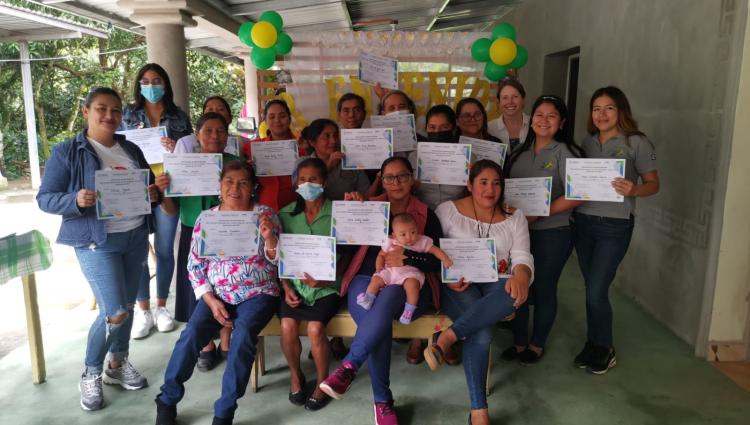
As an Ag Business Consultant with Farm Credit, much of Heather Week’s role is sharing her wealth of business management and finance skills with our local farmers. But as a former Peace Corps Volunteer, Heather also has a passion for traveling and connecting with farmers around the world, extending her knowledge to them and giving them the tools to succeed.
“Travel connects us and helps create empathy between people,” explains Heather. “I can use my experiences as an Ag Business Consultant to help farmers around the world and bring those experiences back to help farmers here in the Mid-Atlantic region of the United States.”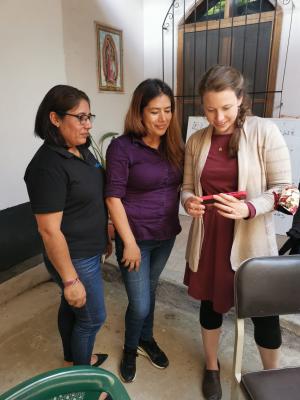
Heather has been a volunteer with the United States Agency for International Development (USAID) funded Farmer-to-Farmer (F2F) program since 2016. The program was established as part of the 1985 Farm Bill to provide technical assistance from U.S. volunteers to farmers, farm groups, agribusinesses, and other agriculture sector institutions in developing and transitional countries with the goal of promoting sustainable improvements in food security, agricultural processing, production, and marketing.
F2F volunteers are encouraged to perform outreach about their assignments upon returning to the United States, and that’s exactly how Heather first learned about the program: listening to another volunteer, a former Farm Credit CEO no less, share his travels and experiences with the program. “I started my first assignment in 2016 by sending in my resume to the agencies that administer the program, and since then, I’ve been contacted whenever an agency has an assignment that matches my skills,” said Heather. She has since volunteered in-person four times, and remotely seven times.
Most recently, Heather returned from two weeks in Honduras with a group of women that formed a cooperative to support women’s empowerment and end violence against women through income generating opportunities. The group, referred to as MUJALE, stands for Mujeres Emprendedoras al Éxito (Women Entrepreneurs for Success). Most of its members are coffee growers who identified a need to create a collection center and identify access to markets. Coffee represents 5% of Honduras’ Gross Domestic Product (GDP); they are the largest coffee exporter in Central America, and the fifth largest in the world. At the end of the assignment, Heather assisted the group in creating a business plan to help the women execute their goal of increasing their production and sales of coffee.
When asked of her experience in Honduras, Heather said it was “fun, open, and filled with great food and coffee.” She added that she enjoys receiving assignments in Central and South America because it allows her to develop and actively use her Spanish skills.
Heather’s other in-person volunteer experience includes assignments in Colombia, Tanzania, and Guyana. Her first F2F assignment in 2016 was to Colombia, where she worked with the Agri-Business program at a local university teaching students who would later become agronomists, extension agents, and agribusiness professionals. Her second assignment was in Tanzania with a co-op of vegetable growers. Heather trained them for two weeks on agribusiness concepts like the ones used in Farm Credit’s AgBiz Master’s program. She was also able to observe how they grow their vegetables and manage their irrigation systems. In 2019, her last in-person assignment before the COVID pandemic, Heather visited Guyana. Her partner for this assignment was the Guyana Marketing Corporation who represent agro-processors that create value added products and assist them with marketing to both domestic and international markets. Heather particularly enjoyed this visit because she was able to travel to indigenous communities to teach them how to calculate their costs of production and identify products they could market domestically and for export.
During the COVID pandemic, Heather never stopped actively volunteering with F2F. Although she could not physically travel outside of the country, she completed numerous virtual assignments and was able to provide support remotely to Tanzania, Malawi, Zimbabwe, and Tajikistan. For her Zimbabwe assignment, she partnered with a Milk Collection Center and worked with them to help them improve their record keeping and organizational structure.
Heather sees F2F as an extension of her volunteer work here in the U.S. – serving as a Big Sister for Big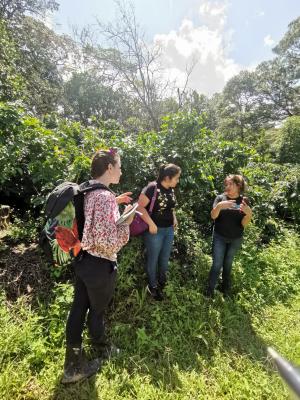 Brothers Big Sisters, FFA and 4-H, Habitat for Humanity, etc. In addition, her travels allow her to learn more about global markets and the influence that America’s decisions have on the rest of the world and the agricultural industries we work in. They have also allowed her to learn about new commodities that aren’t grown in the Northeast or Mid-Atlantic region of the United States such as coffee, chocolate, bananas, rice, and more. She has learned that in these assignments, little wins are important. Many times, a scope of work for an assignment includes ambitious goals like QuickBooks support, only to find that the farmers don’t use computers and have never done a balance sheet. The best assignments start with a general plan but have a lot of options and ability to adapt as the project goes on.
Brothers Big Sisters, FFA and 4-H, Habitat for Humanity, etc. In addition, her travels allow her to learn more about global markets and the influence that America’s decisions have on the rest of the world and the agricultural industries we work in. They have also allowed her to learn about new commodities that aren’t grown in the Northeast or Mid-Atlantic region of the United States such as coffee, chocolate, bananas, rice, and more. She has learned that in these assignments, little wins are important. Many times, a scope of work for an assignment includes ambitious goals like QuickBooks support, only to find that the farmers don’t use computers and have never done a balance sheet. The best assignments start with a general plan but have a lot of options and ability to adapt as the project goes on.
If you are looking to get involved, F2F seeks volunteers in all aspects of farming and agriculture. Agencies and Non-Governmental Organizations administer the program in different regions. You can start by searching a region you might like to travel to and then seeing if they have any assignments that fit your skills. You may also submit a resume to let agencies know you are interested and specify, if applicable, that a particular time of the year is best. For example, Heather specifies that her ideal time is during the summer when her U.S. farming clients are busy in the field. Volunteers travel for two to six weeks for their assignments or provide virtual assistance, often with a partner volunteer (local expert) in the country. Assignments can be anything from practical agricultural skills like beekeeping, Integrated Pest Management (IPM), artificial insemination, or ruminant nutrition - to marketing, organizational development, and finance. Anyone interested can visit farmer-to-farmer.org.
In all of this, Heather expresses that it’s important to understand people’s reality instead of just news headlines.
“Just as we tell consumers to get to know their local farmer in order to know how their food is produced, the same is true for other cultures. These assignments are work, but the goal is to get to know people, share our cultures, and learn from one another.”
Newsroom
Interest Rates and Early Payoffs - What You Need To Know

Evaluating your loans, rates, and use of cash reserves each year is a best business and personal finance practice. Planning is key, and these tips should aid in your decision making on current and future loans.
Everything is costing more money today, and borrowing money is no exception. Whether its mortgages, auto and equipment loans, personal loans, home equity lines of credit, or business lines of credit, payments on borrowed funds have increased significantly in the last 12 months.
You’re probably wondering, “What is driving the increased payments?” In early 2022, the Federal Reserve announced they were raising the key interest rate in order to fight inflation. Since then, they have raised rates by 2.25 percent, meaning for every $1,000 owed, borrowers are paying an additional $22.50. As interest rates rise, the amount of interest due on borrowed money increases, thus resulting in a higher required payment.
For those who have a fixed rate loan, your payments should have remained the same, because at the time the loan originated, your interest rate was locked in for a set period of time, resulting in a consistent payment over the term of the loan. An exception would be if you obtained a fixed to variable rate loan at time of origination. On these loans, after a certain period of time, the rate will become variable, meaning it is subject to change, which could affect your payment. Reach out to your lender to see when the fixed rate expires and discuss your options.
If you have a loan with a variable interest rate, you have probably noticed a considerable increase in the required payment due because as the benchmark or index rate changes, the interest rate on the loan has also changed. While a variable rate loan is not as enticing in a rising rate environment, there are benefits to using them:
- Short term borrowing needs where the interest rate may still be lower than if you were to obtain a fixed rate
- Situations where you will be advancing the funds over a period of time, instead of taking one lump sum at time of origination
If you currently have a variable rate on a term loan, you may want to discuss options for fixing the rate for the remaining term with your lender. There are advantages and disadvantages to both fixed and variable rates, which is all dependent on your particular situation.
We are often asked by customers if they should pay off their loans early with extra cash at the end of the year. For some of our crop and dairy operations, it is a good year. Yes, input costs are up, but it may be the third or fourth most profitable year for some dairy producers with probably the highest milk price we have seen in the industry. When asked about paying loans off early, the standard consulting answer is, “It depends”.
Before paying your loan off early, it’s important to consider:
- The type of loan (line of credit, equipment, or long term mortgage)
- Interest rate on the loan
- Plans you have the next few years
If you know you have plans to build something or make a major purchase in the next few years and will need to borrow, it may be better to use your cash and keep the low interest rate loan you have, especially if it is fixed rate.
If you have no major investments in the short term (3-5 years) planned, then paying off variable rate loans first isn’t a bad move.
We recommend to producers these same best practices during both good and bad times:
- Pay down lines of credit first. These are great cash reserves when you need them.
- Build liquidity and more importantly, liquid reserves. Liquid reserves outside the available line of credit are cash and/or investment accounts and prepaid expenses (normal operating items we pre-purchase to defer income taxes – this is not equipment purchases to defer taxes).
- Consider putting some funds away for retirement. This will make transitioning the business easier in the future if you have saved some for retirement.
- Purchase capital items that are needed or necessities (not wants), as long as the goals for the above three items are met.
- Reduce your debt. Putting this at the bottom of the list assumes that the business is in a good financial position and has positive cash flow prior to paying off debt first. Increasing rates may make it more important to not pay off low interest rate loans if you are planning to borrow more at higher rate (even though rates are still low compared to the 80s and 90s).
How do we decide where to put the funds? Planning! Tax, cash flow, and business planning are key to doing this well. If we have good goals with our plans, it will make deciding what to pay off, or what not pay off, easier.
If you’re ready to start the conversation for a loan or about your current farm finances, reach out to our team at 888.339.3334 or visit HorizonFC.com today.
This blog was written by Deanna Husfelt, Farm Credit Regional Credit Officer and Michael Hosterman, Farm Credit Ag Business Consultant.
The Horizon Farm Credit Annual Stockholder meeting is a pillar of the cooperative lending model that encourages transparency in business performance and community involvement.
Newsroom
Together, our farmers can rise
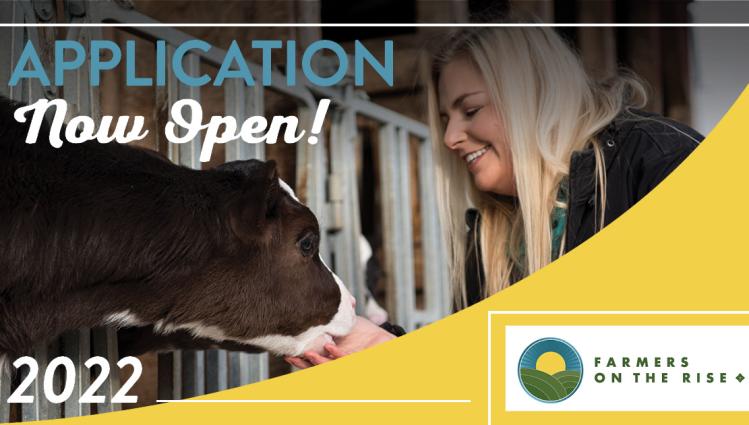
By Johanna Rohrer, Member Education and YBS Program Specialist, Horizon Farm Credit
Regardless of age, experience, or geographical location, the agricultural industry presents an opportunity for young and beginning farmers to pave their own unique path. Here at Farm Credit, we believe in providing them with the resources to do just that.
Our Association’s footprint is uniquely positioned across five states, serving 100 counties of urban, suburban, and rural agriculturalists alike. The mid-Atlantic region offers a diverse perspective of agriculture in our corner of the United States – and while our Association’s area of reach may have grown recently due to our merger, the passion and investment we have for our community has remained the same.
Still holding true to the centuries-old traditions of agricultural life, we have seen a new generation of producers utilizing their diverse professional backgrounds and experiences to engage consumers in innovative ways. Young agriculturalists, some returning from school, others pivoting from their current career path or continuing the family legacy, are finding opportunities in agriculture.
As a rural and agricultural lending cooperative, Farm Credit knows farming can be a challenging business, particularly for those producers just starting out. We also know the average age of the American farmer is 57.5 (according to the 2017 U.S. Census of Agriculture), and in order to ensure we continue to produce the food, fuel, and fiber consumers near and far demand, it is essential to support young and beginning farmers.
This year, we have decided to continue our Farmers on the Rise award program to honor, empower, and reinvest in the next generation of agriculture. This program was created to commend farm owner-operators who excel in their field based on their efforts in agriculture, financial character, leadership, community involvement, and environmental stewardship. We will offer up to ten $10,000 awards to the finalists selected by a judging panel. Applications are accepted online at FarmersOnTheRise.com by September 30, 2022.
We are excited to see all of the groundbreaking plans that our future ag leaders have on the horizon! If you’re ready to discuss options for loans or programs for your farm business, give us a call today at 888.339.3334.
Please enter a valid password to access this page:
Wrong password. Try again!Newsroom
Farm Credit Partners with PA Dairymen’s Association to Support Central Pennsylvania Food Bank
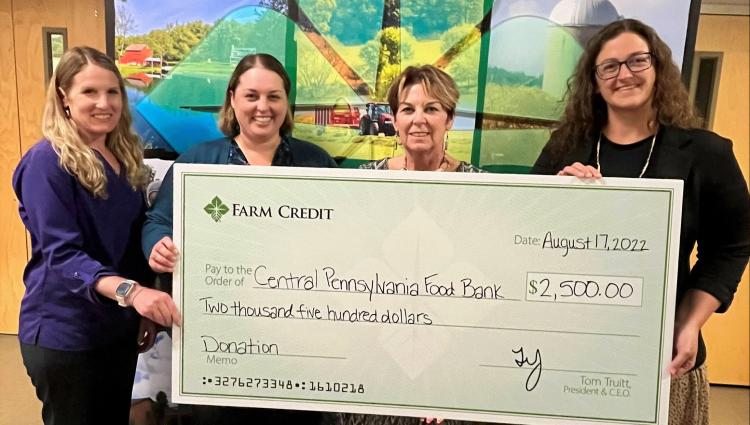
Horizon Farm Credit partnered with the Pennsylvania Dairymen’s Association for a milkshake popup event on August 17 at their Headquarters office to raise money for the Central Pennsylvania Food Bank. Farm Credit matched the price of all milkshakes sold that day with a donation to the Central Pennsylvania Food Bank, totaling $2,500.
“As a cooperative, our Association is deeply connected to our local communities and customers,” says Tom Truitt, CEO of Horizon Farm Credit. “We are proud to be able to assist the Central Pennsylvania Food Bank with a donation to continue fighting hunger and improving lives in our region.”
The milkshake popup event was the first official welcome to Horizon Farm Credit’s Headquarters office for industry partners and community members in the Mechanicsburg area. More than 75 visitors stopped by to purchase a milkshake in support of the Central Pennsylvania Food Bank and to network with Farm Credit staff. Members of Horizon Farm Credit’s Executive Leadership team were in attendance, as well as Beth Hamilton, Director of Food Sourcing & Logistics for the Central Pennsylvania Food Bank, who accepted the check on behalf of the organization.
“The PA Dairymen’s Association has been a trusted partner throughout the years for Farm Credit and for the state of Pennsylvania’s dairy farmers,” adds Truitt. “Horizon Farm Credit is happy to continue working with this statewide organization to support the dairy industry and education.”
To learn more about Horizon Farm Credit, visit HorizonFC.com today or call 888.339.3334. Information about the Central Pennsylvania Food Bank can be found at centralpafoodbank.org. Learn about the PA Dairymen’s Association at padairymens.com.
Newsroom
Farm Credit Launches Farmers on the Rise Award Program
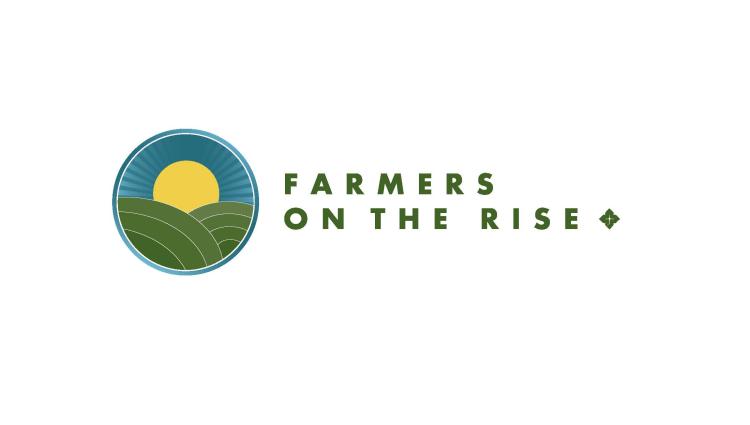
Horizon Farm Credit recently announced their second annual Farmers on the Rise program, awarding up to ten $10,000 prizes to young, beginning, small, minority, and/or veteran farmers in their footprint.
“This award program was created to honor ten outstanding farm owner-operators within the diverse agricultural community looking to expand their existing agricultural business,” says Tom Truitt, CEO of Horizon Farm Credit. “Those selected to receive an award will be recognized based on their efforts in agriculture, financial character, leadership, community involvement, and environmental stewardship.”
The contest is open to applicants that identify with at least one of the following categories:
- between 18 and 35 years of age,
- minority operator,
- veteran operator,
- operate a small farm with annual gross ag income less than $250,000,
- or a beginning farmer with at least two years of farming experience, but no more than 10 years.
In 2021, Farm Credit awarded six recipients with Farmers on the Rise awards. “Farm businesses ranged from livestock and grain to aquaponics and produce for urban communities and CSAs,” says Johanna Rohrer, Member Education & YBS Program Specialist at Horizon Farm Credit. “Our panel of judges is looking forward to reviewing the applications this year and seeing the inspiring dreams of our region’s producers.”
This program is open to all farmers. You do not need to be a Farm Credit customer to apply, but must reside in Horizon Farm Credit’s footprint. The deadline to submit an entry is September 30, 2022. For more eligibility requirements and to apply, visit farmersontherise.com. If you have any questions about this program or application, please email learning@horizonfc.com.
Newsroom
Have a Locally-Sourced Summer
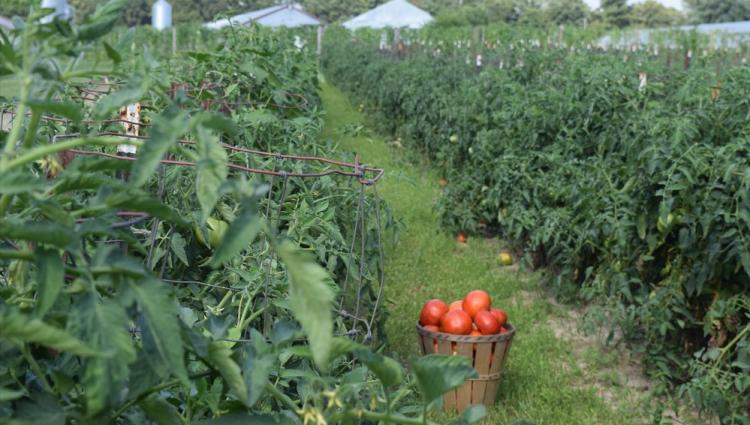
Ellie Grossnickle, Ag Relationship Manager, Horizon Farm Credit
We are officially in the heat of the summer, which means it’s nearly impossible to drive anywhere without passing a roadside market with fresh produce. I could make a meal off of fresh-picked sweet corn. In Maryland, where there are more than 90 famers markets to choose from (according to Maryland Department of Agriculture’s 2022 Farm Market Directory), getting my sweet corn fix is no problem. Whether you’re stopping by the farmers market, on-farm store, or roadside stand, buying local is a perfect way to support your local community’s economy while getting the freshest product.
Aside from a delicious taste and friendly staff, one of the best parts of buying local is knowing exactly who you are buying from, and having the satisfaction that everything you are paying for is going directly into a farmer’s pocket. As a fellow farmer and neighbor, I’m able to see the countless hours spent and sacrifices made to get their product from farm to table, so even if I do pay a little more than I might somewhere else, it’s worth knowing who it’s helping. Astronomical input costs have created a trying first half of 2022 for all farmers, so I feel good knowing my contribution goes a long way.
A couple that is serving up some of the best locally grown food is Jamie and Robin Enders of Glen Arm, Maryland. The Enders own and operate Willow Valley Farm where they raise beef, pork, chicken, and eggs, which they sell in a small store located at the entrance of their farm. Along with their own products, they also sell a variety of goods sourced from other local farmers. When asked why the Enders believe in buying local, Robin says, “By supporting local farmers, you are enriching your community by keeping resources local. Willow Valley Farm employs many local teenagers that are often looking for first time jobs. Buying local also reduces travel costs, which helps not only our wallets, but our environment.”
Buying local doesn’t mean you can’t also support farmers that don’t have the ability to sell to a direct market, but it’s a convenient way to get a fresh product while supporting local communities. My family ships milk to the Maryland and Virginia Milk Producers Cooperative, which eventually ends up in grocery stores. While I firmly believe in the quality and freshness of that milk product, I still love to support our local creameries and enjoy some freshly churned ice cream when I have the chance. And, if you’re searching for locally grown food in Pennsylvania, look for the PA Preferred checkmark logo on products in grocery stores like Giant, ShopRite, Walmart, Wegmans, and Weis.
Supporting both markets is important to the viability of our food system. With National Farmers Market week being celebrated August 7 through 13, be sure to check out what the farmer next door to you has to offer. To find a market in your area, check out the 2022 National Farmers Market Directory: ams.usda.gov/local-food-directories/farmersmarkets.
If you’re dreaming of growing local products for your community to enjoy, or currently raising products and need financial assistance, reach out to me or a member of our team today by calling 888.339.3334 or visiting HorizonFC.com. Farm Credit is ready to help you take the next step in your farming business.
Newsroom
Horizon Farm Credit Announces 2022 Second Quarter Financial Results

Horizon Farm Credit has announced the 2022 second quarter financial results from its two legacy Associations, AgChoice Farm Credit and MidAtlantic Farm Credit. The two Associations merged on July 1, 2022, at the conclusion of the second quarter, forming Horizon Farm Credit.
“AgChoice Farm Credit and MidAtlantic Farm Credit had strong second quarter financials, resulting in the start of a consistent, reliable new cooperative this July as Horizon Farm Credit,” says Tom Truitt, Horizon Farm Credit CEO. “Both legacy Associations saw increases in net accruing loan volume and net interest for the first half of 2022, proving the strength of the agricultural industry and our cooperative despite the economic challenges we all continue to face.”
AgChoice Farm Credit’s net accruing loan volume for the first six months of 2022 was $2.7 billion, an increase of 12.8 percent compared to the same 2021 period. Net interest income for the second quarter of 2022 was $16.3 million, an 8.8 percent increase from the same time period in 2021. Net income for the quarter was $4.4 million, a 66.8 percent decrease compared to the second quarter of 2021, principally related to a donation of $3 million to the Farm Credit Foundation for Agricultural Advancement in 2022, as well as one-time merger related costs.
Nonaccrual loans decreased $1.2 million in the second quarter of 2022 to $5 million, compared to $6.2 million at December 31, 2021 and $7.6 million at June 30, 2021. The association’s nonaccrual loans as a percentage of total loans decreased to 0.18 percent at the end of the second quarter of 2022, compared to 0.24 percent at the end of 2021 and 0.31 percent at the end of the second quarter of 2021.
Members’ equity at June 30, 2022 totaled $477.5 million, up 1.1 percent from December 31, 2021, and the Total Capital Ratio was 16.03 percent. That number is compared with the 10.5 percent minimum mandated by the Farm Credit Administration (FCA), the Association’s independent regulator. The Association paid a record-breaking cash patronage distribution of $50.2 million to its member-borrowers in March 2022.
MidAtlantic Farm Credit’s net accruing loan volume for the first six months of 2022 was $3.1 billion, an increase of 7.1 percent compared to the same 2021 period. Net interest income for the second quarter of 2022 was $19.6 million, a 3.6 percent increase from the same time period in 2021. Net income for the quarter was $11.9 million, a 10.2 percent decrease compared to the second quarter of 2021, principally related to the Paycheck Protection Program (PPP) loan fees received in 2021, as well as one-time merger related costs.
Nonaccrual loans decreased $2.1 million in the second quarter of 2022 to $35.5 million, compared to $37.6 million at December 31, 2021 and $40.1 million at June 30, 2021. The association’s nonaccrual loans as a percentage of total loans decreased to 1.14 percent at the end of the second quarter of 2022, compared to 1.24 percent at the end of 2021 and 1.36 percent at the end of the second quarter of 2021.
Members’ equity at June 30, 2022 totaled $672.0 million, up 0.10 percent from December 31, 2021, and the Total Capital Ratio was 20.55 percent. That number is compared with the 10.5 percent minimum mandated by the Farm Credit Administration (FCA), the Association’s independent regulator. The Association paid a record-breaking cash patronage distribution of $83.9 million to its member-borrowers in March 2022.
For more information about the financial results and Horizon Farm Credit, visit horizonfc.com.
Summer is here and it's time to have some fun! Make unforgettable memories with delicious food, exciting rides, entertaining games, livestock animals, and more. The fair is the perfect place for Farm Credit customers to come together and enjoy all the festivities.
